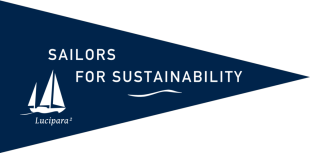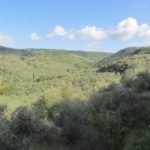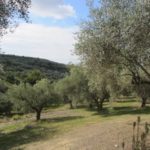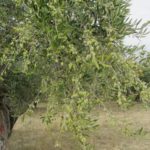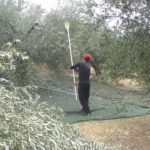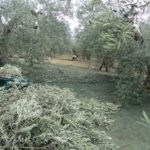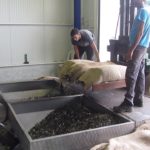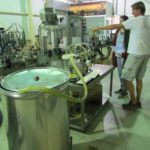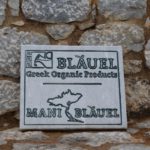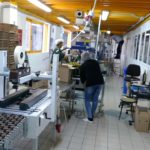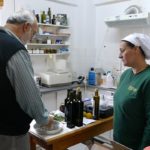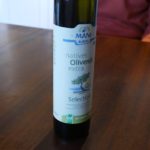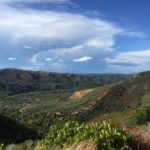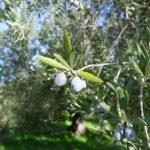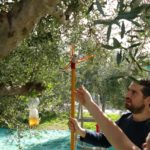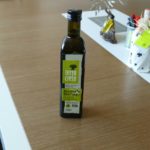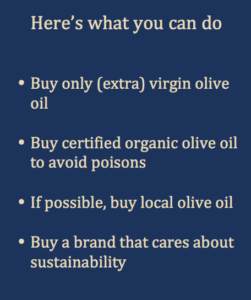Greek Gold (GRC)
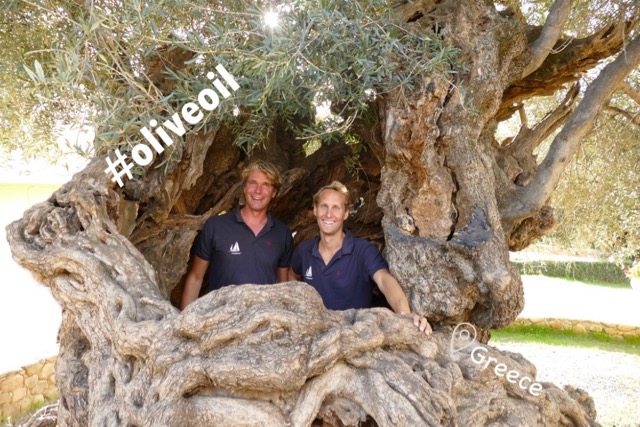
In Greece we take a closer look at olive oil, which is an integral part of Greek history and culture. And discover ways of growing olives sustainably.
Contributes to achieving the following UN Sustainable Development Goals:
“Let’s explore by kayak first,” Floris proposes. Not much later we paddle from our anchorage to the mysterious marina in the Greek town of Pylos. “It’s full of boats here, yet we couldn’t find anything online about it. Remarkable!” Ivar comments just as we hear our names and see someone waving at us from a pontoon. We meet fellow countryman Hans. “I follow your project and saw that you were in the bay. This marina went bankrupt years ago, but you can still use the facilities, free of charge!” We thank Hans for his warm welcome and paddle back to Luci. Not much later we’re moored opposite him. Over drinks we listen to Hans’s stories about friendly Greeks, life in a marina without harbormaster and the most important activity in this region: olive growing.
Forever Thankful
In the evening we read that the olive tree has been an intrinsic part of Greek civilization since antiquity. The capital Athens even owes its name to the olive tree. According to legend, Athena, goddess of wisdom and peace, fought with Poseidon, god of the sea, over the rule of the city. Whoever performed the most noble and useful act would win. Poseidon gave the city a water source, but the salt water was of little use. Athena gave the city an olive tree and with it olives, their golden oil, shade and fine-grained, hard and versatile wood. The grateful inhabitants named the city after their new patron.
But olive oil is more than a tradition. It also has a reputation of being healthy. The monounsaturated fats contained in them are said to be good for preventing cardiovascular diseases. What we would like to find out is: how sustainable is today’s olive oil?
Harvest Time in Kalamata
We start our explorations in Kalamata, one of the most famous Greek olive regions. Olive trees are everywhere we look. Along the road we also pass olive presses and stop at one of them, Kanakis. It’s a family business that also makes organic olive oil. As we step into the big hall where the press is, we notice how busy it is. “Harvest time has just started, so olive farmers come to us each day to have their harvest pressed”, owner Ilias Kanakis explains. Still, true to Greek hospitality, they make time for us and invite us to see the harvest with our own eyes.
At the olive grove, we appreciate that harvesting olives involves a lot of manual work. Men strike the olives from the trees with a type of rake. The olives fall into nets under the tree. Then they go into jute bags, which are stacked on a pick-up truck. The olive farmer explains that the trees need a lot of care. “Every year we prune them, otherwise we will miss a lot of olives. We spray the trees with pesticides against the olive fly and spray herbicides, fertilizer and water to harvest more. It’s expensive, but we earn back the extra cost with the larger harvest.” It seems that the farmer’s use of additives is mainly economically driven, so we wonder how it is for nature? Somewhat hesitantly, he admits: “The soil suffers and the trees don’t grow so old. But hey, we need to make money.”
We drive back to Kanakis and arrive at the same time as the pick-up truck from the olive grove. The jute bags are emptied onto an assembly line, after which the olives are washed and pressed in modern, stainless steel machines. Gold-colored olive oil comes out of the press at the end of the line. Ilias takes a sample of the oil. “Now we determine the quality with a chemical analysis. Cold pressed oil from fresh olives we call virgin, vierge, but only the best quality can be called extra vierge. For this the oleic acid content may not exceed 0.8%.” We ask him about the organic olive oil that he sells. “That’s from olives which were not sprayed with agricultural poison,” Ilias explains.
Organic and Social
Curious about organic olive oil we visit family business Mani Bläuel. It was founded by Austrian Fritz Bläuel, who tours around the facility. He explains: “In the 1980s I noticed that more and more farmers were considering using agricultural poison and other chemical additives. I managed to convince them that it was their traditional, organic way of growing that set them apart from the mainstream olive producers.” Fritz establishment a consumer brand for Greek organic olive oil, which helped to maintain the region’s well-established traditions.
Fritz shows us modern storage tanks and filling lines. He clarifies: “Our machines run on solar energy and we only sell organic extra virgin oil.” At a bookcase with prices and certificates he stops. “The high quality of our olive oil is recognized internationally” he smiles, proudly. Apparently, organic olive oil is not only good for nature and health, but also stands for quality.
Fritz’s son Felix recently took over the day-to-day management of the company. He tells us that the company adheres to standards that go beyond the requirements for organic certification. “We have a certification from Naturland, which means that we guarantee good social conditions in the production process.” It’s become obvious to us that the Bläuels are real pioneers. They not only set high standards for nature, but raise the bar even further by guaranteeing good working conditions.
Crete’s World Record
When the winds are favourable, we sail to Crete. “Every year, the islanders use about 31 litres of olive oil per person, a world record!” Floris reads. It is not hard to guess where that oil comes from; there are about 30 million trees on the island.
We visit Terra Creta, a local producer of olive oil with a large organic product range. Markos Polakis, responsible for sales and marketing, gives us an extensive tour. He knows a great deal about olive trees, oil production and sustainable growing methods, as becomes evident when we stop at an olive tree with a bottle hanging from a branch. “The bottle contains a sweet liquid that lures and kills the dreaded olive fly. Hanging them in each tree is a bit more work than spraying pesticides, but it works well”, Markos assures us. He adds that they have been selling organic olive oil for years, but recently went a step further. “We started the sustainable olive oil initiative. Under the guidance of agricultural experts, we teach a select group of farmers how they can keep olive trees healthy in a natural way. Instead of maximising the harvest in the short term, the focus is on the well-being of the tree in the long term.”
Check the Label
“I really believe in a more sustainable approach, but it is an uphill battle” Markos sighs. “If you see bottles in the store with words like Classic or Traditional on the label, then you really have to watch out. They contain mainly refined oil, which is oil that is extracted by adding chemicals to the pit and peel leftovers at high temperatures. This cheap residual oil should really belong in soap or lamp oil, but mixed with virgin oil it is sold as consumption olive oil in supermarkets.”
Markos finally takes us to a special place, the oldest olive tree on the island and possibly in the world. It is estimated to be more than two thousand years old. The gigantic trunk is completely hollow inside. Carefully, we creep inside it. “To think what this tree has been through,” Ivar whispers, “and it still carries olives. What a wonder of nature.”
Sustainable Ways Have the Future
It has become clear to us that the olive tree is central to Greek history, culture and cuisine. “With attention to natural production methods, use of renewable energy and good working conditions it is quite possible to buy olive oil that is reasonably sustainable”, Floris concludes. “I agree, although improvements are still possible in terms of transport and packaging”, Ivar adds. You can incentivise producers to adopt more sustainable methods if you buy organic extra virgin oil. If olive trees are treated with respect instead of poisoned for short-term profit, you get a poison-free product, and hopefully the Greek gold can be enjoyed for thousands of years more.
Related Sustainable Solutions

Smart with Seaweed (NZL)
In New Zealand we learn how seaweed can be used to improve soil biology, with significant environmental and economic benefits for all farm types.

Urban Gardening (NZL)
In New Zealand’s cities we discover various ways of urban gardening and learn about the many benefits of growing food in cities.

Improving Children's Health with Veggies (PER)
High in the Peruvian Andes, poor school children learn how to grow and cook healthy, organic veggies. An example for the world?

Meatless in Buenos Aires (ARG)
In the beef capital of the world, the tide is turning in favour of plant-based diets. Good news for human health, animals, nature, and the climate.

Alda's Organic Neighbourhood Farm (URY)
Organic farmer Alda explains how fertile soil enables her to grow food without poison, increases biodiversity, and has positive climate effects.

Natural Coffee (BRA)
We visit a coffee forest in Brazil and learn all about the environmental and social benefits of agro-ecology.

Food Forests (BRA)
In Brazil, Ernst Götsch explains to us how to grow healthy food in cooperation with the forest.

Bananalogic (ESP)
On the Canary Island of La Palma in Spain, we discover that the logical way to grow bananas is with butterflies instead of poison.

Olive Oil (GRC)
In Greece we take a closer look at olive oil, which is an integral part of Greek history and culture. We discover ways of growing olives sustainably.

Slow Food (ITA)
The Slow Food movement promotes food that is good for the consumer, good for the producer, and good for the planet.
